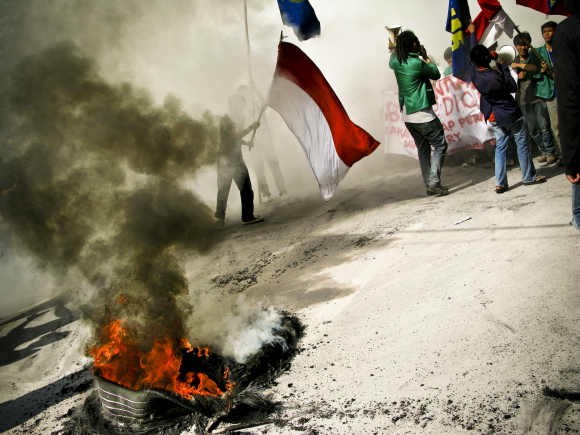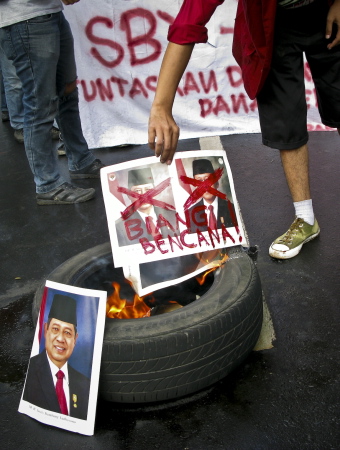Dirk Tomsa
Protesters prepare to burn images of the president and vice presidentHenri Ismail |
On 20 October 2009 Susilo Bambang Yudhoyono (SBY) was sworn in as Indonesian President for a second five-year term. Having won the presidential election in a landslide, the old and now new president exuded confidence and high aspirations when he took the oath of office in the national assembly in Jakarta.
He had good reason to be confident. Not only had the election given him a very strong popular mandate, but he had also succeeded in cobbling together a coalition of major parties to support him in parliament. In return, he rewarded these parties including Golkar, the Prosperous Justice Party (PKS) and a few others with key posts in the new cabinet. Once all the ministers had settled into their new (and, in some cases, not so new) offices, SBY took a leaf out of the Australian Prime Minister’s book of tricks and organised Indonesia’s first ever ‘National Summit’. On the agenda to discuss with more than 1500 public figures were what policy programs the government should prioritise in the coming years but more specifically in the first 100 days. It was obvious that SBY was off to a good start. Public approval ratings were sky-high, his coalition partners seemed reasonably happy and international investors expressed optimism about Indonesia’s economic future.
But then things took a turn for the worse. Within just a few weeks, Indonesia was rocked by a series of scandals that effectively paralysed the political process and put some noticeable dents in the president’s popularity. By the time he marked his first 100 days in office, SBY’s public approval ratings were in decline, though they were still very high at around 70 percent. His coalition was divided and anti-government demonstrations, some of which were quite violent, occurred in several major cities across Indonesia. So what went wrong?
Repeated scandals
It all began with attempts to undermine the powerful and popular Corruption Eradication Commission (KPK). Though probably overrated in much of the Western media, the fight against corruption had certainly been one of SBY’s pet projects during his first term in office and the success of the KPK in recent years no doubt reflected very positively on the president. Large parts of Jakarta’s elite, however, resented the work of the commission.
Some efforts to curb its influence had already been made towards the end of SBY’s first term when legislators in the House of Representatives delayed budget approvals and watered down the wording of the new Anti-corruption Court Law. But the campaign against the KPK reached new heights when its chairperson Antasari Azhar became entangled in an obscure murder trial and then two deputy chairs, Bibit Rianto and Chandra Hamzah, were accused of having solicited bribes. While Antasari was sentenced to 18 years in jail in February (he maintains his innocence though and has appealed the verdict), the case against Bibit and Chandra was quickly revealed to have been fabricated and the two men were reinstated in their jobs after their three-month suspension.
As the allegations against the two anti-corruption warriors faltered, a new scandal took centre stage – this time focused on two of SBY’s most trusted aides. Both vice-president Boediono and Finance Minister Sri Mulyani are widely known as economic reformers with impeccable credentials so, like the KPK, they and their policies are anything but popular in certain circles in Jakarta. Sri Mulyani, for example, has had various spats with Golkar chairman and business tycoon Aburizal Bakrie over alleged tax evasion. Meanwhile Boediono’s pro-Western viewpoint and his apparent lack of piety had become a bone of contention between the president and PKS.
 |
In the name of IndonesiaHenri Ismail |
It all came to a head when it was revealed that in 2008 Boediono and Sri Mulyani had played key roles in authorising the bailout of Bank Century. The payment had been endorsed by parliament, but the amount of money that was eventually used in the process (Rp 6.76 trillion, A$809 million) far exceeded the original authorisation. Alleging that some of that money had found its way into the coffers for SBY’s 2009 election campaign, critics of the president initiated a parliamentary inquiry into the bailout. When it became obvious that no evidence for an involvement of the president could be marshalled, the inquiry’s focus shifted to Boediono and Sri Mulyani.
Significantly, the two never denied their involvement. Instead, they defended their actions as justified under the circumstances of the global financial crisis. Not unexpectedly, a restive parliament did not share their views. Backed by SBY’s unruly coalition partners, Golkar and PKS, the bailout was eventually declared unjustified and marred by corruption and other irregularities. Moreover, parliament recommended that the two cabinet members be subjected to further investigation – ironically, by the KPK.
The fallout
Though widely regarded as farcical and politically motivated, the inquiry into the Bank Century scandal, coupled with the two other scandals, did cause some damage to SBY. Not only were his anti-corruption credentials tarnished but he had also lost the support of two of his coalition partners and given new ammunition to those who accuse him of being indecisive and overly sensitive to criticism. For example, when protesters brought a buffalo to a street demonstration in Jakarta, the president reacted by issuing a decree that banned the presence of animals at public demonstrations.
On balance, however, the Bank Century saga has probably done more damage to those who initiated the lengthy inquiry than to the president. The longer the investigation lasted, the wearier the public became of the daily telecasts. It also became increasingly obvious that the inquiry was much more about political vendettas than it was about uncovering the truth behind the bailout. As if that were not enough for parliament to be suitably embarrassed, some legislators did not even shy away from further humiliation when they started an all-out brawl in the House on the day the final recommendations of the inquiry were due. In view of these events and the ongoing discussions about the inquiry and its political fallout, it seems unlikely that the whole investigation has endeared any of the parties that supported it to the ordinary voter.
Dirk Tomsa (d.tomsa@latrobe.edu.au) is a lecturer in Politics and Asian Studies at La Trobe University in Melbourne. He is the author of Party Politics and Democratization in Indonesia: Golkar in the Post-Suharto Era.
